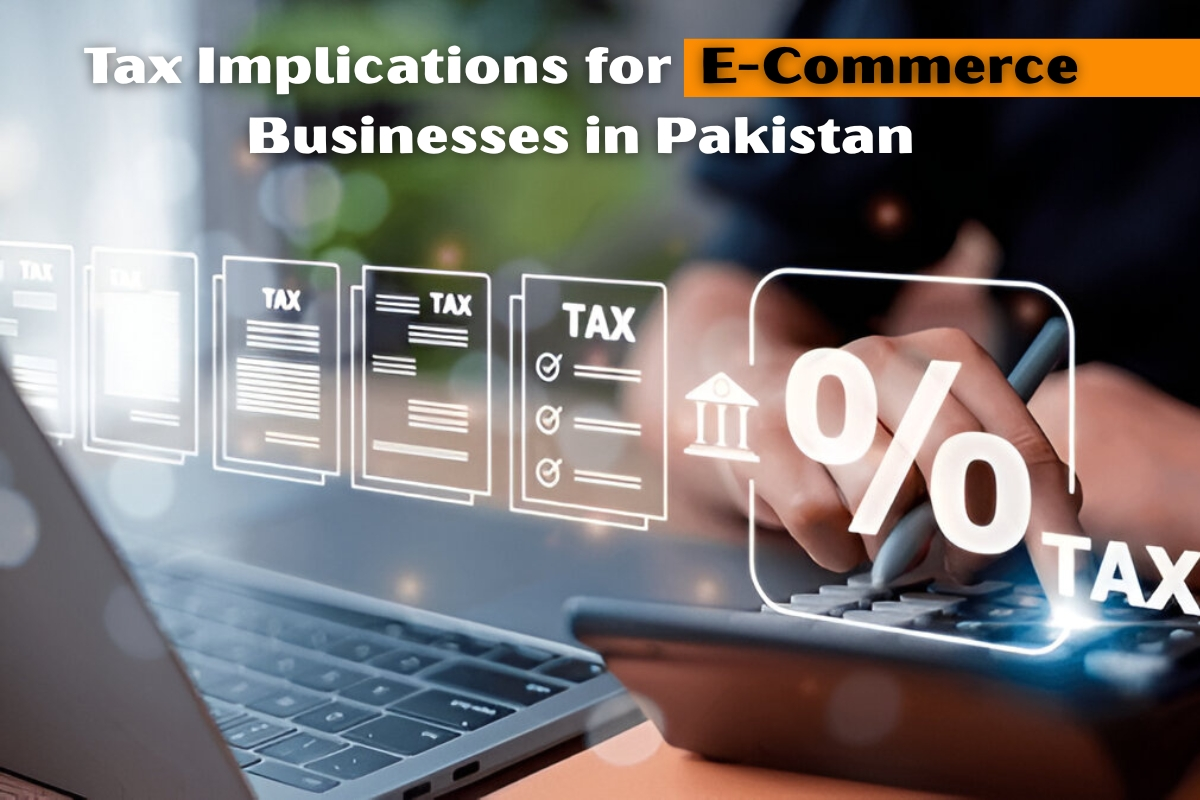Tax Implications for E-commerce Businesses in Pakistan

Tax filing in Pakistan is not easy. For a common filer, the process often feels confusing. Rules are complex. Rates keep changing. Digital and cash transactions are treated differently. Many filers do not know which taxes apply to them.
For e-commerce businesses, the situation is even harder. These businesses deal with online payments, courier deliveries, and multiple platforms. Every transaction is linked with a tax deduction. A common tax filer often feels lost while figuring out the right tax amount.
The current tax season is a crucial time for every business owner to get their financial affairs in order. However, many find themselves lost in a maze of rules and procedures.
The problem is that common people lack information. There is great confusion between different tax rates for digital payments and Cash on Delivery (CoD), on top of that, the daunting task of filing returns correctly. Many small and e-commerce businesses struggle with manual accounting, without having knowledge of compliance and financial requirements, they often end up with penalties.
This blog explains the tax implications for e-commerce businesses in Pakistan. It also highlights the common problems faced by filers. The goal is to spread awareness during this tax season.
Understanding the E-Commerce Tax Landscape
The 2025 tax system in Pakistan is designed to formalize the digital economy and encourage the use of digital payment methods. The Federal Board of Revenue (FBR) has introduced specific provisions for online businesses. These rules make sure that online sales are part of the tax system. This system works through withholding agents. These are companies that collect tax at the time of payment. For e-commerce, these agents are primarily payment intermediaries and courier services.
The Differential Tax Rates: Digital vs. CoD
A key element of the current tax regime is the difference in tax rates applied to digital payments and Cash on Delivery (CoD) transactions.
Digital Payments: When a customer does a transaction through digital means, such as a credit card, a debit card, or a mobile wallet, the payment intermediary (like a bank or a payment gateway) is responsible for withholding tax. The rate for this is 1% of the gross receipts.
Cash on Delivery (CoD) Payments: For transactions paid for through CoD, the courier service delivering the goods is responsible for collecting the tax. The rate for this is a higher 2% of the gross receipts.
This differential is not a mistake; it’s a deliberate policy to promote a cashless economy. By making CoD transactions more expensive from a tax perspective, the government incentivizes both sellers and buyers to use digital payment methods. This makes the entire process more transparent and easier to track, which benefits the tax authorities and helps formalize the economy.
Key Tax Implications for Your E-Commerce Business
Every Pakistani owner of an e-commerce company should be aware of a number of other tax ramifications in addition to the withholding tax.
1. Income Tax Filing
As a business owner, you are required to file an annual income tax return. This is the main document where you declare your total income, claim any deductions, and calculate your final tax liability. The withholding tax collected by payment intermediaries and courier services is not your final tax. It is an advance tax that you can adjust against your total income tax liability when you file your return.
How it works: Let’s say your business made a total of PKR 1,000,000 in a financial year, with PKR 500,000 from digital payments and PKR 500,000 from CoD. The withholding tax collected would be PKR 5,000 (1% of 500,000) and PKR 10,000 (2% of 500,000), respectively. Your total advance tax paid would be PKR 15,000. When you file your return, you will calculate your total tax due based on your net income (revenue minus expenses). If your total tax liability is, for example, PKR 20,000, you will only have to pay the remaining PKR 5,000 (20,000 – 15,000). If your tax liability is less than the amount already paid, you may be eligible for a refund.
2. Sales Tax (GST)
If your business is registered for sales tax, you must also file a monthly sales tax return. The standard General Sales Tax (GST) rate in Pakistan is 18%. While some businesses may be subject to a 2% sales tax on digitally ordered goods, it is important to understand which tax applies to you. For businesses registered under the normal GST regime, the 2% collected by intermediaries is a withholding of sales tax, which you would adjust against your overall 18% liability.
Important distinction: It is crucial to distinguish between the income tax and the sales tax. They are two separate taxes with different rules and filing requirements. Income tax is on your business’s profit, while sales tax is on the value of the goods you sell.
3. Wealth Statement
Every tax filer in Pakistan is also required to file a wealth statement. This document provides a snapshot of your assets and liabilities. It’s a way for the FBR to cross-check your declared income and ensure that your lifestyle and assets are in line with your declared earnings. This is a mandatory requirement for both individuals and businesses.
Common Problems and Challenges for E-Commerce Owners
Despite the government’s efforts to simplify the tax system, many e-commerce business owners, especially those running small-scale operations, face significant challenges.
Complex Filing Process: For someone who doesn’t know a lot about money or the law, the FBR’s internet portal, IRIS, might be hard to use. The forms are hard to fill out, and even one error can get you in trouble or possibly an audit.
Reconciling Withholding Tax: A major challenge is reconciling the withholding tax. As an e-commerce seller, you receive payments from multiple sources (e.g., different payment gateways and courier companies), each with its own withholding certificate. Keeping track of all these deductions and ensuring they are correctly reported in your annual return can be a tedious and confusing process.
Maintaining Records: Often, deductions shown in seller accounts do not match with FBR data. A lot of small firms in Pakistan still maintain track of their records by hand, using things like Excel sheets or paper ledgers. This makes it very hard to keep track of sales, expenses, and tax deductions, which are all important for paying your taxes correctly.
Fear of Audit: The fear of a tax audit is a significant barrier for many business owners. They may be hesitant to become a “filer” because they are afraid of facing scrutiny from the FBR, even if their business is legitimate.
How to Overcome the Challenges and Stay Compliant
Following tax rules is not only the law; it’s also the basis for developing a firm that will last and be trusted. When you are a registered taxpayer, you gain access to benefits like better payment gateways and a more professional reputation, and you can avoid hefty penalties.
Here are some simple steps you can take to make the process easier:
Get Your NTN: The first step is to register for a National Tax Number (NTN) or your CNIC will be your NTN if you are an individual. This is a simple process that can be done online through the FBR portal.
Maintain Proper Records: Use a simple accounting system or software to keep a digital record of all your sales, expenses, and inventory. This will make it much easier to prepare your financial statements for tax filing.
Separate Business and Personal Finances: Do not mix your bank accounts for professional and personal use. This easy step will clear up a lot of uncertainty and make the process of filing taxes and keeping track of your finances much easier.
Understand the Difference: Educate yourself on the difference between income tax and sales tax, and know which applies to your business.
Empower Your E-Commerce Business in 2025 with Smart Tax Solutions
Tax implications for e-commerce businesses in Pakistan are real and often confusing. Sellers have to deal with a lot of deductions, tight timelines, and complicated filing rules. Many people have trouble following tax rules when they don’t have the right help.
The current tax month is the perfect opportunity to get your tax affairs in order. Don’t wait for a penalty to hit. Take control of your financial future and build a solid foundation for your e-commerce business.
If you are an e-commerce business owner feeling overwhelmed by the complexities of tax implications and the problems associated with tax filing, there is help available. Go PK Resources is dedicated to simplifying this process for you. We provide expert assistance in NTN registration, income tax and sales tax filing, and the reconciliation of withholding taxes. Our services are designed to make tax compliance easy and hassle-free. We can help you find your way through the tax maze and make sure your firm is on the right track for long-term success.



